|
|
|
Sort Order |
|
|
|
Items / Page
|
|
|
|
|
|
|
| Srl | Item |
| 1 |
ID:
163995
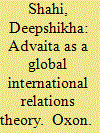

|
|
|
|
|
| Publication |
Oxon, Routledge, 2019.
|
| Description |
ix, 170p.hbk
|
| Series |
Rethinking Asia and International Relations
|
| Standard Number |
9781138497740
|
|
|
|
|
|
|
|
|
|
|
|
Copies: C:1/I:0,R:0,Q:0
Circulation
| Accession# | Call# | Current Location | Status | Policy | Location |
| 059594 | 327.101/SHA 059594 | Main | On Shelf | General | |
|
|
|
|
| 2 |
ID:
099109
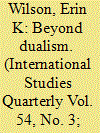

|
|
|
|
|
| Publication |
2010.
|
| Summary/Abstract |
The world's religions have strong traditions of contributing to theories and practices around justice. Recent debates on global justice within International Relations (IR), however, have largely overlooked possible contributions from religion. This article explores why religion is neglected, despite its potential for constructive involvement in the pursuit of global justice. I argue that dominant macro-level conceptions of both global justice and religion within IR have been limited by dualism. Combining Kristeva's (1986) reading of Bakhtinian dialogism and Prokhovnik's (2003) relational thought, I propose expanded understandings of both religion and global justice that move beyond dualism. These expanded understandings open up creative ways for IR scholars and practitioners to engage in processes aimed at overcoming global inequalities and injustices.
|
|
|
|
|
|
|
|
|
|
|
|
|
|
|
|
| 3 |
ID:
094751
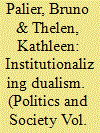

|
|
|
|
|
| Publication |
2010.
|
| Summary/Abstract |
The French and German political economies have been significantly reconfigured over the past two decades. Although the changes have often been more piecemeal than revolutionary, their cumulative effects are profound. The authors characterize the changes that have taken place as involving the institutionalization of new forms of dualism and argue that what gives contemporary developments a different character from the past is that dualism is now explicitly underwritten by state policy. They see this outcome as the culmination of a sequence of developments, beginning in the field of industrial relations, moving into labor market dynamics, and finally finding institutional expression in welfare state reforms. Contrary to theoretical accounts that suggest that institutional complementarities support stability and institutional reproduction, the authors argue that the linkages across these realms have helped to translate employer strategies that originated in the realm of industrial relations into a stable, new, and less egalitarian model with state support.
|
|
|
|
|
|
|
|
|
|
|
|
|
|
|
|
| 4 |
ID:
099792
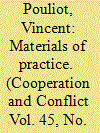

|
|
|
|
|
| Publication |
2010.
|
| Summary/Abstract |
In this article I argue that the Cartesian dualism informing dominant theories of International Relations (IR) has limited analytical purchase at the level of practice. The materials that enable and constrain contemporary diplomatic practices between NATO and Russia seamlessly combine natural, cultural and organizational artefacts: nuclear warheads take on a symbolic life of their own; linguistic formulations transform into 'things'; and committee meetings inscribe intersubjective dynamics with a new materiality. To materialist theories à la neo-realism, practice theory shows that material objects matter not because they have an immanent meaning, but rather because, in becoming part of social relations, they acquire a form of agency of their own, making people do things they would not have done otherwise. To IR constructivism, this article demonstrates that it is not only people who attach meanings to things; things also attach meanings to people. Enmeshed in social relations, material objects often acquire an epistemic life of their own that may affect, in turn, the very people who constructed them.
|
|
|
|
|
|
|
|
|
|
|
|
|
|
|
|
| 5 |
ID:
151203
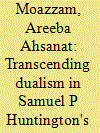

|
|
|
|
|
| Summary/Abstract |
Glorification of ‘self’ (Western civilisation) at the expense of the ‘other’ (eight civilisations) was inherent in Huntington’s Clash of Civilizations thesis. The ‘other’ civilisations identified—as the non-self and situated mostly in the Global South—were clubbed together as the Rest, irrespective of their pluralism. Building on Huntington’s binaries—the West and the Rest—this article makes an attempt to reflect on similarities within the perceived differences. Even though his civilisations appear different, they are in many ways similar due to interactions, colonisation and globalisation. Their relationship has become complicated; Western civilisation cannot do without civilisations from the Global South. Hence, there can be no perpetual or fixed enemy nor can all relationships be suspended with the ‘other’ in a globalising world.
|
|
|
|
|
|
|
|
|
|
|
|
|
|
|
|
| 6 |
ID:
120859
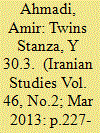

|
|
|
|
|
| Publication |
2013.
|
| Summary/Abstract |
The Gathic stanza Y 30.3 has always been at the center of various interpretations and controversies in Western scholarship on Zoroastrianism. Those who believe they have discovered in the Gathas a monotheistic religion armored with an ethical dualism have made this stanza one of the pillars of their thesis. The so-called Twins stanza shows, according to this view, that the good and evil primordial spirits exist as a result of their choice between Good and Evil, which preserves not only the absolute goodness of the supreme god but also his uniqueness. More recently Kellens and others following him have given a completely different reading of the stanza. According to their account, this stanza is a speculation on the hidden processes of ritual. What the poet expresses in Y 30.3 is not a dualism, ethical or otherwise, but a psychology of the process by which man makes his choice of ritual conduct. Aside from the question of coherence, one must ask whether these accounts are borne out by the text they claim as their basis. This article addresses these two questions.
|
|
|
|
|
|
|
|
|
|
|
|
|
|
|
|
|
|
|
|
|